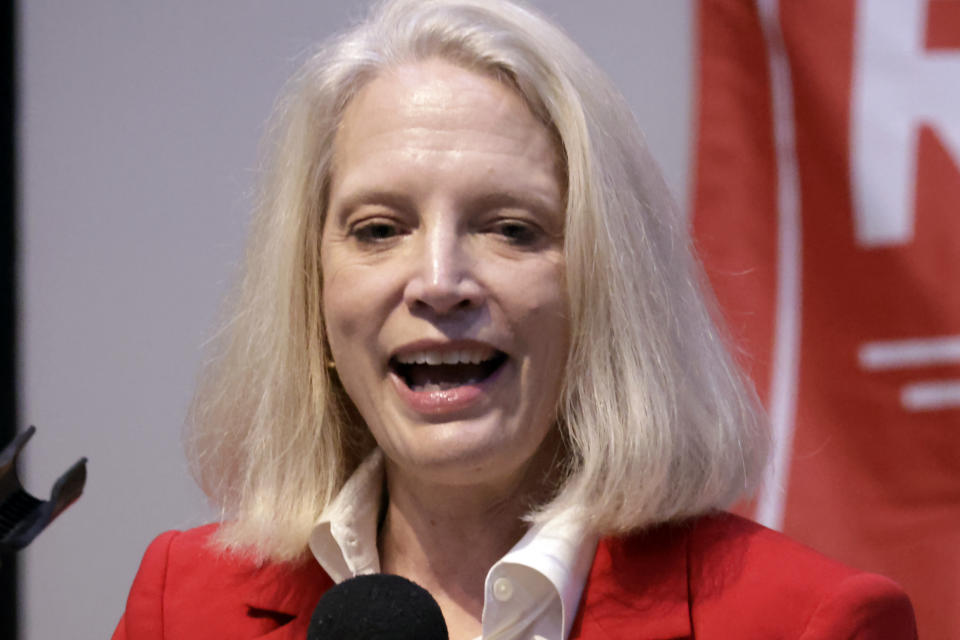Brad Knott, backed by Trump, wins Republican runoff for North Carolina congressional district
- Oops!Something went wrong.Please try again later.
RALEIGH, N.C. (AP) — Brad Knott, a candidate backed by former President Donald Trump, overwhelmingly won the Republican primary runoff for North Carolina’s 13th Congressional District on Tuesday against a rival who suspended her campaign two weeks ago in response to the endorsement.
The former assistant U.S. attorney defeated Kelly Daughtry, a local lawyer and the daughter of a former longtime Republican legislative leader. Daughtry had finished first among 14 candidates in the March 5 primary. But she failed to exceed the 30% necessary to avoid a runoff, which Knott sought as the second-place finisher.
In statewide GOP primary runoffs Tuesday, Hal Weatherman won the nomination for lieutenant governor and Dave Boliek won the nomination for state auditor. Like Knott, they also advance to the general election in November.
Trump backed Knott in early April. It wasn’t until weeks later, on May 2, that Daughtry, who was also the top fundraiser in the primary largely thanks to her personal campaign loans, suspended her campaign and threw her support to her rival. But by then, early voting was well underway, and it was too late to take her name off the ballot.
Daughtry said Trump’s endorsement of Knott made clear to her “that a pathway to victory is no longer feasible.”
Knott’s victory once again highlights Trump’s history of successful interventions in North Carolina GOP politics.
Knott now will take on Democrat Frank Pierce in the general election. The GOP-dominated General Assembly reconfigured the 13th District last year so that it is more rightward leaning. The new district covers all or parts of eight counties in or close to the capital of Raleigh.
Current 13th District Democratic Rep. Wiley Nickel chose not to run for reelection, citing the boundary changes. The seat is one of three the GOP expects to add to the U.S. House from North Carolina this fall, thanks to redistricting.
In a written statement late Tuesday, Knott thanked Trump and members of the North Carolina congressional delegation for their endorsements, and said it was time to focus on winning in November.
“We need Conservatives from all across the country to stand strong with President Trump and deliver real solutions in Congress. I look forward to doing just that,” Knott said.
Trump, the presumptive Republican presidential nominee, won North Carolina, the country’s ninth-largest state, in both the 2016 and 2020 presidential elections, and the state is expected to be a presidential battleground this fall.
Trump’s social media post endorsing Knott called him a “Strong Patriot” who would support law enforcement, secure the U.S.-Mexico border and protect gun rights.
As for Daughtry, the daughter of a former longtime Republican legislative leader, Trump called her a “RINO” — Republican in Name Only — and someone who “is no friend to MAGA,” a reference to Trump’s “Make America Great Again” slogan.
This year marks the second time Trump has endorsed a Daughtry opponent; in a 2022 primary for the 13th District, he backed her challenger and then-political newcomer Bo Hines, the ultimate primary winner.
Trump also endorsed then-U.S. Rep. Ted Budd in the 2022 GOP primary for U.S. Senate. Budd easily defeated former Gov. Pat McCrory, then went on to win the general election. In the recent March primary, Trump backed first-time candidate Addison McDowell, who ended up winning the 6th Congressional District race.
Weatherman, the former chief of staff to then-Lt. Gov. Dan Forest, defeated Forsyth County District Attorney Jim O’Neill in the lieutenant governor's primary. Weatherman will take on Democratic state Sen. Rachel Hunt, daughter of former four-term Gov. Jim Hunt, in the fall election.
Boliek, an attorney and former chairman of the University of North Carolina at Chapel Hill trustee board, defeated CPA and state legislative staffer Jack Clark in the auditor's primary. Boliek will take on Democratic State Auditor Jessica Holmes in November.
GOP runoff voting was open to registered Republicans and unaffiliated voters who either voted in the March Republican primaries or didn’t vote at all.


